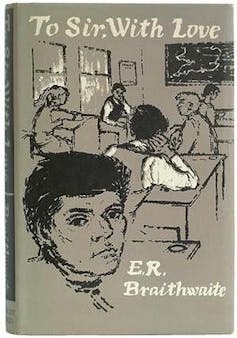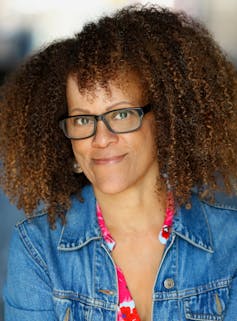Malachi McIntosh, Queen Mary University of London
In many ways, the current state of the world seems unprecedented. The last few years – but especially 2020 – have brought shocks that no one could have foreseen.
Although much headline news has been cause for anxiety, there have been a few notable moments of hope. For me, like so many, the worldwide protests in response to the murder of George Floyd have been among them.
To call the uprisings “unprecedented” would be to potentially undersell how much tensions have been bubbling beneath the surface and all the work that was already being done by activists to draw attention to these issues. Among the uprising’s hopeful surprises has been the way they’ve torn open space for conversations about race and racism in the UK.
Why don’t we teach all British schoolchildren about colonialism. Why does it take so much more convincing to have the statues of slaveowners removed than those of others responsible for past atrocities? Why were so many young people of colour so quickly mobilised to say “the UK is not innocent”, in solidarity with their peers on the streets in the United States?
With the boom in interest in the histories of colonialism, empire and the British civil rights movement in response to Black Lives Matter protests, has come an aligned boom in interest in Black British writing.
Candice Carty-Williams and Bernardine Evaristo won significant firsts for Black authors at the British Book awards – book of the year and author of the year, respectively. Reni Eddo-Lodge, author of Why I’m No Longer Talking to White People about Race, became the first Black Briton to top the paperback non-fiction chart, while Evaristo topped the fiction list.
Across social media and newspapers, reading lists proliferated, apparently responding to a hunger from readers of all backgrounds to gain knowledge of issues and the history of race and racism they’d never received in schools or universities.
For many in and on the fringes of the publishing industry, it’s felt hopeful that a moment of real recognition for Black British writing, in an echo of the attention being paid to Black British lives, has arrived.
But has it really? Although the accelerated pace of interest feels unique, the pattern – social unrest triggering readerly interest in the works of writers of colour – is, unfortunately, not.
Post-war Booms (and Busts)
Immediately after the second world war there was a similar boom. Britain was about to enter a long phase of decolonisation, and its demographic make-up, through waves of colonial then ex-colonial migration, was on course to permanently change. This opened up space and piqued curiosity for works from the most visible group at the centre of social transformation – at that time Caribbean emigrants.
As detailed in Kenneth Ramchand’s book The West Indian Novel and Its Background, from 1950 to 1964, over 80 novels by Caribbean authors, including classics like In the Castle of My Skin by by George Lamming and A House for Mr Biswas by VS Naipaul were published in London – far more than those published in the Caribbean itself.

What’s most significant about that spike is that it didn’t last. As Caribbean migration waned after the passage of a series of restrictive immigration acts from 1962 to 1971, so did the opportunities for writers from Caribbean backgrounds.
This was evident in the fortunes of most of the those published in Britain post-war. The likes of Edgar Mittelholzer and John Hearne - then known and widely published - and even Samuel Selvon - now widely known and respected - found their works falling out of print.
Attention then shifted to Black writers from the African continent – primarily those from west Africa, like Chinua Achebe and Wole Soyinka – where the progress of decolonisation was taking dramatic turns. But this interest also waned.
There have been more recent booms, for example in the 1980s after the New Cross fire in 1981, which sparked protests in south London after 13 young black people were killed, and the Brixton uprising of the same year in response to excessive and, at times, violent policing in the area.
Then, around the turn of the millennium, rechristened “multicultural” writing rose, alongside visible demographic change, through the successes of Zadie Smith, Andrea Levy, Monica Ali and others. These were breakthroughs significant enough for Wasafiri, the magazine where I work and which has been championing Black British and British Asian writing since 1984, to declare in 2008 that Black Britons had “taken the cake” of British letters.
Yet in 2016, eight years later, only one debut novel from a Black British male author, Robyn Travis, was published in the UK.
The Future
In her memoirs, the British writer and editor Diana Athill calls the post-war boom in writing from then-colonies a result of short-lived “liberal guilt” combined with curiosity about the peoples and nations disconnecting from Britain. There are concerning signs along these lines in our present.
In their recent report on UK publishing – a result of over a hundred interviews with those in the field – Anamik Saha and Sandra van Lente reveal that British publishers feel that they ought to publish more writers of colour, and that those same writers belong to a particular niche with limited quality and limited appeal to their target readers.

Anticipating this conversation in her 2019 essay What a Time to Be a (Black) (British) (Womxn) Writer, first published in the book Brave New Words on the eve of her Booker Prize win, Bernardine Evaristo both celebrated and questioned the growing body of Black British writing.
Something, she notes in the essay, is definitely shifting, but she wonders how far it will really shift. If Black Britons are being published in greater numbers but on singularly narrow terms. Like their forebears in the 1950s, 1960s, 1980s and early 2000s, are there only certain stories Black writers are allowed to tell? Only certain messages they’re expected to convey?
While it is far too early to make a judgement on how long the current boom will last, the way this moment repeats a pattern of social change followed by publishing frenzy is at least worthy of attention - and perhaps scepticism. So often the present seems unprecedented, but in order for it to be truly revolutionary, novel, status-quo shifting – liberating – the changes we see within it have to be sustained.![]()
Malachi McIntosh, Emeritus professor in British Black and Asian Literature, Queen Mary University of London
This article is republished from The Conversation under a Creative Commons license. Read the original article.
Comments